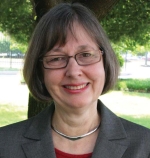 I find myself most grateful to In Trust's board of directors when they nudge me in new directions. While I savor their praise and encouragement, I thrive when they push me to learn — when their support entices me to go beyond the tasks and skills that are my natural bent. Often the venue for our most open discussion - our most direct and fruitful discussion — is the executive session held during each board meeting.
I find myself most grateful to In Trust's board of directors when they nudge me in new directions. While I savor their praise and encouragement, I thrive when they push me to learn — when their support entices me to go beyond the tasks and skills that are my natural bent. Often the venue for our most open discussion - our most direct and fruitful discussion — is the executive session held during each board meeting.
Last year's organization-wide evaluation provides a case in point. A significant feature of the assessment included formal evaluations for both the president and the board. The process involved four simultaneous components:
-
A third-party evaluator conducted phone interviews with key funders and influentials in the field of theological education about In Trust's mission, services, and leadership — the president and board included.
-
Our board chair developed a list of formal questions about my performance and about the state of our organization. Then he conducted telephone interviews with each board member and In Trust's two program directors.
-
At the same time, I was asked to write a self-evaluation.
-
Meanwhile, the board also engaged in a self-assessment survey and a Governance Mentor reviewed the results with the board.
Aspects of all four components were presented to the full board and staff, and then in executive session, the president and board explored emerging issues. While both the board and I were delighted with the congruence in our perspectives, we also discovered a significant inconsistency. I was more explicit than the board about the board's own need for recruitment and development to keep pace with our strategic needs. And the board was more explicit than I about the lead time required for any future leadership transitions. The two perspectives were then linked as one strategic initiative — leadership development for a high-performing board and staff.
A second example of the fruitfulness of the executive session took place as the board began to move toward more sophisticated financial planning. The staffs and boards of small mission-driven organizations like ours (our budget is under $1 million) can all too easily slip into short-sighted financial planning based on current fiscal reports, or even the annual audit's two-year comparison. But In Trust has been blessed with leaders in governance, and in the executive session, some of them pressed for longer-range thinking, better financial data, and more aggressive projections. In exchange, they are now expressing more interest and offering more assistance with fundraising.
One final example: The executive session has also allowed the board to probe my own well-being. Their interest included providing time off for personal renewal. These sessions are also the place where I can demonstrate staff members' increasing capacity for service and then work with the board on budgets that demonstrate its respect for the staff.
The habit of meeting in executive session — with me present for about half of the 30–45 minutes allotted — began more than a dozen years ago and continues to bear fruit. Not only has it created the time and space for the board to hone its corporate identity, but it has also raised the bar for staff-generated data and reports that advance the board's capacity to safeguard In Trust's mission. Trust grows with each session, and I look forward to the board chair's follow-up conversations with me, when I know I'll be reminded that I'm never alone in my commitment to In Trust's future service to theological education.